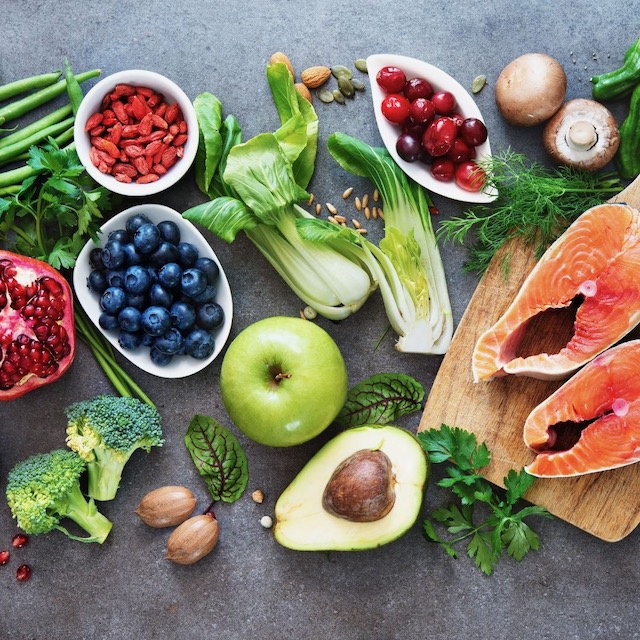Diet plays a much bigger role in Parkinson’s disease than most people realize. While no single food can stop or reverse the condition, strong evidence now shows that what we eat can influence how symptoms develop, how well medication works, and how people feel day to day. The message from researchers is becoming clearer: eating fresh, balanced, and unprocessed food can make a real difference to living well with Parkinson’s.
The Mediterranean and MIND Diets
Two of the most well-studied eating patterns for brain and body health are the Mediterranean diet and the MIND diet. Both are rich in vegetables, fruit, legumes, whole grains, olive oil, nuts, seeds, and fish, while keeping red meat, sugar, and processed foods to a minimum.
The Mediterranean diet has long been praised for protecting the heart and extending lifespan. More recently, studies suggest it can help protect the brain too. Its high levels of antioxidants and anti-inflammatory nutrients may reduce oxidative stress—a process that damages nerve cells and accelerates Parkinson’s progression.
The MIND diet combines the Mediterranean and DASH (Dietary Approaches to Stop Hypertension) diets but places an extra focus on foods proven to support brain function. These include leafy greens, berries, beans, whole grains, and olive oil, while limiting butter, cheese, and fried or fast foods. People who follow the MIND diet tend to experience slower cognitive decline and, according to some research, may slow down the progression of Parkinson’s.
For people living with Parkinson’s, this guidance translates into simple, practical steps: eat a variety of colorful vegetables and fruits every day, choose whole grains over refined ones, add healthy fats such as olive oil and nuts, include oily fish like salmon or sardines several times a week, and cut back on processed snacks and sugary drinks.
Brain‑Boosting Foods for Parkinson’s
Based on the cookbook “A Cookbook for Individuals with Parkinson’s Disease” by J. Etemovic, the recommendations for eating well with Parkinson’s are both practical and scientifically grounded. The book offers 28 carefully crafted recipes emphasising antioxidants and omega‑3 fatty acids, drawing attention to the foods that matter most for brain and nerve‑cell health. It highlights nuts and seeds as excellent sources of healthy fats and vitamin E, berries as rich in neuroprotective polyphenols, oily fish like salmon or sardines for essential omega‑3s, and green leafy vegetables which deliver fibre, vitamins and plant compounds that help reduce inflammation. The guidance also encourages replacing animal fats with olive oil and using fresh herbs and spices to boost flavour and antioxidant intake. The overall message is clear: include a variety of minimally‑processed whole foods that nourish the brain and support the nervous system, rather than relying on packaged or convenience meals.
Why Many People Go Dairy-Free
A growing number of people with Parkinson’s choose to reduce or avoid dairy products. Several large studies have linked higher dairy consumption—especially milk—with an increased risk of developing Parkinson’s and, in some cases, faster symptom progression.
The exact reason isn’t entirely clear. Researchers believe that dairy may affect the way dopamine is processed in the brain or that pesticide residues and proteins in milk might interfere with nerve health. Lactose intolerance and gut inflammation, which are common in Parkinson’s, may also play a role.
For those who prefer to avoid dairy, plant-based alternatives such as oat, almond, or soy milk are easy substitutes. These options fit well within the Mediterranean diet and support better digestion for many people with Parkinson’s.
The Mischley Study: What People Eat Matters
A 2017 study led by Dr Laurie Mischley at Bastyr University offered one of the most detailed looks yet at how diet affects Parkinson’s progression rather than just risk. The team analyzed data from more than a thousand people living with Parkinson’s who shared their eating habits and tracked their symptoms over time.
The findings were striking. Those who ate more fresh vegetables, fruit, nuts, seeds, herbs, non-fried fish, and healthy oils reported slower progression of symptoms. In contrast, those who frequently consumed beef, fried or canned foods, sugary drinks, ice cream, cheese, and yogurt saw their symptoms worsen more quickly.
Once again, dairy appeared among the foods most strongly linked to faster decline. The dietary pattern that emerged looked remarkably similar to the Mediterranean diet, which has long been associated with lower inflammation and better metabolic health.
Moderate wine consumption was linked with mild benefits, while processed and high-fat animal products tended to correlate with poorer outcomes. People who used supplements like fish oil or Coenzyme Q10 showed slightly better progression scores, although the results for supplements overall were mixed. Interestingly, iron supplements were associated with faster worsening of symptoms, possibly because excess iron promotes oxidative stress in the brain—a key factor in Parkinson’s.
The researchers also noticed a powerful social link: people who had limited access to healthy food or could not afford it tended to fare worse. This finding highlighted that Parkinson’s progression is not just biological but also influenced by lifestyle and socioeconomic factors.
Emerging Interest in Intermittent Fasting
Intermittent fasting—where people limit eating to certain hours of the day or take occasional fasting days—has become an area of growing interest in Parkinson’s research. Early evidence suggests that short fasting periods can activate repair processes in the body, reduce inflammation, and improve mitochondrial function.
Mitochondria are the energy-producing structures inside our cells, and their dysfunction is a hallmark of Parkinson’s. By improving their efficiency, fasting might help protect brain cells and reduce fatigue. While more research is needed, many experts believe it could complement other dietary and lifestyle approaches when done safely and under medical guidance.
What to Avoid: Alcohol and Ultra-Processed Foods
Alcohol is another area where moderation matters. While a small glass of wine with dinner can fit within a Mediterranean-style diet, regular or heavy drinking can worsen sleep, coordination, balance, and medication side effects. For most people with Parkinson’s, keeping alcohol intake to a minimum—or avoiding it completely—is the safest choice.
The same goes for ultra-processed foods. Packaged snacks, ready meals, and sugary desserts tend to be high in salt, sugar, and trans fats, which can trigger inflammation and fatigue. They also displace more nutritious foods from the diet, depriving the body of vitamins, fibre, and essential fatty acids that help keep the nervous system healthy.
Limiting Red Meat and Processed Poultry
For people with Parkinson’s, reducing red meat and avoiding processed or chlorinated chicken can be beneficial. High consumption of red meat has been linked to inflammation and other health risks, while chlorinated chicken, common in the US, may affect gut health and overall wellbeing. Opting for lean protein sources like fish, eggs, legumes, or plant-based alternatives can support better long-term health and help manage Parkinson’s symptoms more effectively.
Balancing Protein: Timing Matters for Parkinson’s
Another crucial part of managing diet in Parkinson’s is balancing protein intake throughout the day. This is because dietary protein can interfere with the absorption of levodopa, the main medication used to manage Parkinson’s symptoms. Both protein and levodopa use the same transport system in the gut and across the blood–brain barrier, so when they compete, less medication reaches the brain. The result can be more “off” periods, slower symptom control, or fluctuations in movement.
To reduce this effect, many people with Parkinson’s find it helpful to follow what’s known as a protein redistribution diet. This simply means keeping protein intake low earlier in the day—ideally under about 10 grams for breakfast and lunch—then eating the majority of daily protein at dinner. Doing so allows levodopa to work more effectively during the hours when most people are active, while still ensuring enough protein is consumed later to support muscle strength and overall health.
Practical examples include having porridge made with water or plant milk in the morning instead of cow’s milk, choosing fruit, toast, or salads with light dressing for lunch, and saving higher-protein foods like fish, eggs, beans, lentils, tofu, or meat for the evening meal. It’s not a one-size-fits-all approach, but when done under guidance from a dietitian familiar with Parkinson’s, it can help stabilise medication response and improve daily functioning without compromising nutrition.
The Gut–Brain Connection: Feeding Your Second Brain
Gut health plays a surprisingly powerful role in Parkinson’s. Researchers now understand that the gut and brain communicate constantly through what’s called the gut–brain axis, a two-way system linking the digestive tract, immune system, and nervous system. In fact, some scientists believe that Parkinson’s may begin in the gut years before motor symptoms appear, as misfolded alpha-synuclein proteins seem to start forming in the intestinal nerves and then travel to the brain through the vagus nerve. This makes maintaining a healthy gut not only beneficial for digestion but potentially important for slowing or easing Parkinson’s symptoms.
A balanced gut microbiome—meaning the right mix of good bacteria—helps reduce inflammation, supports better absorption of nutrients and medications, and can even influence mood and energy levels. People with Parkinson’s often experience constipation and slower gut movement, which can interfere with medication timing and comfort, so diet plays a key role here. To nurture gut health, it’s helpful to eat plenty of fibre-rich foods such as whole grains, oats, vegetables, fruit, beans, and lentils. Fermented foods like live yoghurt, kefir, sauerkraut, kimchi, and miso can also help by introducing beneficial bacteria.
Staying well hydrated and reducing ultra-processed and sugary foods further supports gut balance, while limiting red meat and dairy can ease bloating or sluggish digestion in some people. The Mediterranean-style diet naturally aligns with these principles, as it’s rich in fibre, antioxidants, and healthy fats, all of which promote a thriving microbiome. Together, these habits help keep the gut moving, enhance medication effectiveness, and may even support brain resilience over time.
Quick Energy Boosts for “Off” Moments
When people with Parkinson’s feel themselves approaching an “off” period, a small, quick-acting snack that boosts blood sugar can help give an energy lift and improve alertness. Think a piece of fruit, a small handful of dried fruit, a few crackers, or a bit of honey. The goal is to provide a gentle, fast glucose boost to help the brain and muscles function better during those tricky moments, without overloading on sugar. Timing and portion are key – just enough to feel the benefit and avoid blood sugar spikes.
Small Steps, Big Difference
Eating well with Parkinson’s doesn’t require perfection. What matters most is consistency and pattern. Replacing processed food with fresh ingredients, swapping butter for olive oil, or choosing nuts over crisps can all add up to long-term benefits. A colourful, varied diet supports better energy, mood, digestion, and possibly slower symptom progression.
It’s also worth remembering that food is deeply personal. Some people find that certain foods worsen bloating, fatigue, or medication absorption. Keeping a food and symptom diary can help identify triggers and fine-tune eating habits.
Diet alone can’t cure Parkinson’s, but it can shape how people live with it. A diet based on whole, plant-rich, anti-inflammatory foods—like those in the Mediterranean or MIND diets—appears to protect the brain, stabilize energy, and improve quality of life.
Avoiding dairy and ultra-processed foods, eating plenty of fresh produce, and considering gentle fasting routines can all make a meaningful difference. Even small improvements in nutrition can translate into better movement, mood, and overall wellbeing.
Food is more than fuel—it’s daily medicine. In Parkinson’s, where so much feels beyond control, what you eat is something you can control, one meal at a time.

